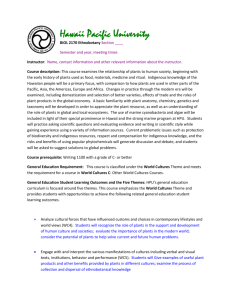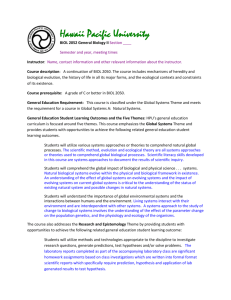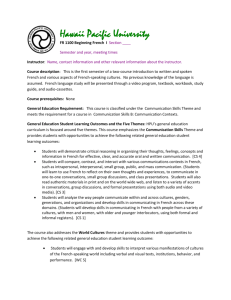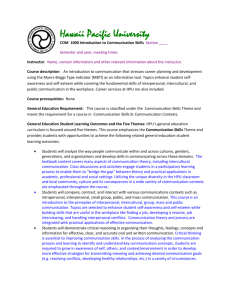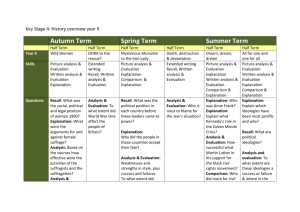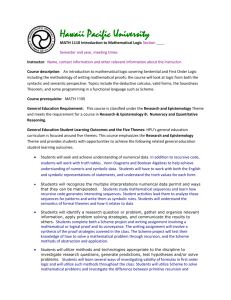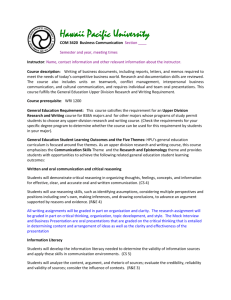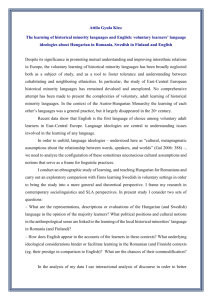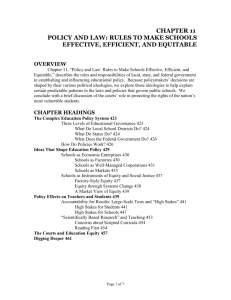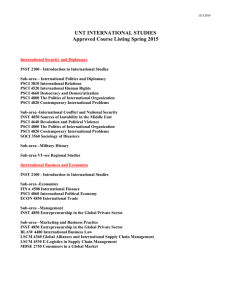Hawaii Pacific University
advertisement
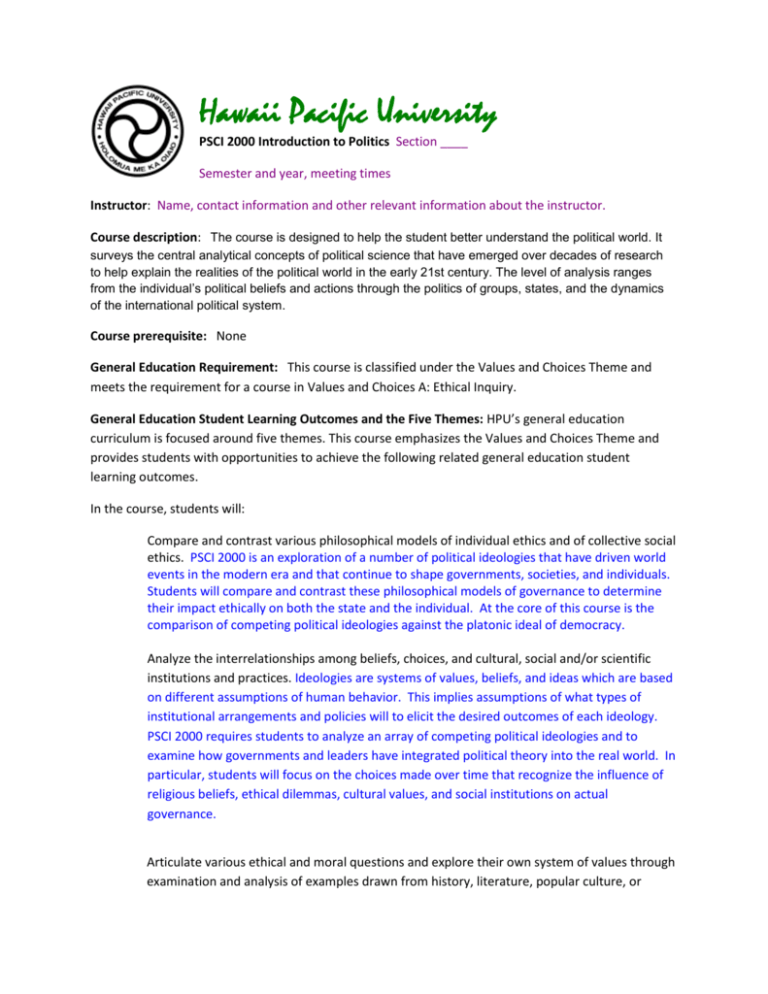
Hawaii Pacific University PSCI 2000 Introduction to Politics Section ____ Semester and year, meeting times Instructor: Name, contact information and other relevant information about the instructor. Course description: The course is designed to help the student better understand the political world. It surveys the central analytical concepts of political science that have emerged over decades of research to help explain the realities of the political world in the early 21st century. The level of analysis ranges from the individual’s political beliefs and actions through the politics of groups, states, and the dynamics of the international political system. Course prerequisite: None General Education Requirement: This course is classified under the Values and Choices Theme and meets the requirement for a course in Values and Choices A: Ethical Inquiry. General Education Student Learning Outcomes and the Five Themes: HPU’s general education curriculum is focused around five themes. This course emphasizes the Values and Choices Theme and provides students with opportunities to achieve the following related general education student learning outcomes. In the course, students will: Compare and contrast various philosophical models of individual ethics and of collective social ethics. PSCI 2000 is an exploration of a number of political ideologies that have driven world events in the modern era and that continue to shape governments, societies, and individuals. Students will compare and contrast these philosophical models of governance to determine their impact ethically on both the state and the individual. At the core of this course is the comparison of competing political ideologies against the platonic ideal of democracy. Analyze the interrelationships among beliefs, choices, and cultural, social and/or scientific institutions and practices. Ideologies are systems of values, beliefs, and ideas which are based on different assumptions of human behavior. This implies assumptions of what types of institutional arrangements and policies will to elicit the desired outcomes of each ideology. PSCI 2000 requires students to analyze an array of competing political ideologies and to examine how governments and leaders have integrated political theory into the real world. In particular, students will focus on the choices made over time that recognize the influence of religious beliefs, ethical dilemmas, cultural values, and social institutions on actual governance. Articulate various ethical and moral questions and explore their own system of values through examination and analysis of examples drawn from history, literature, popular culture, or current events and controversies. In PSCI 2000 students will produce critical analyzes of various political ideologies in which they articulate their understanding of the moral and ethical dilemmas underlying concepts such as the balance between the need for state power and the desire for individual liberty. Case studies will be examined that demonstrate how political ideologies have shaped history and how they continue to generate controversy, influence current events, and inform cultural production in literature, popular culture and the arts. The course also addresses the Communication Skills Theme by providing students with opportunities to achieve the following related general education student learning outcome: Demonstrate critical reasoning in organizing thoughts, feelings, concepts, and information for effective, clear, and accurate oral and written communication. The course is an introduction to critically evaluating political ideas, beliefs and values. Each ideology privileges certain issues and values, while underplaying others. These types of critical analysis are integral components for the study of each ideology covered in the course. They provide models for students to critically assess political issues and the positions advocated by historical and contemporary political actors. In PSCI 2000 students will write 4 critical review essays (of at least 1200 words) that examine particular political ideologies. These papers will be graded on their critical reasoning, organization, and understanding of key political concepts. Students will also be required to demonstrate oral communication skills in classroom discussions and in-class group work. There will also be Internet-based assignments focused on showing visual and other non-verbal examples of political ideologies. Note: Purple text shows places where specific course information must be filled in. Red text contains explanatory notes to the instructor which should be deleted before using the syllabus. Blue explanations above should be rephrased by the individual instructor to reflect the specific approach in that section of the course. Course specific outcomes below are an example and may also be rephrased or modified by the instructor Student Learning Outcomes for PSCI 2000 Introduction to Politics Upon successful completion of PSCI 2000 students will be able to describe and distinguish among the major ideologies of modern times, including liberalism, conservatism, socialism and communism, fascism, “liberation ideologies,” and green politics. situate these ideologies in the historical context and explain the intellectual currents and contemporary anxieties that shape their content demonstrate an understanding of how these ideologies have influenced and continue to influence the way people deal with new issues and changes in social life and the economic system. For the rest of these required syllabus items see the details in the faculty handbook. Delete this note once the syllabus is complete. For online courses there are some additional requirements given at this link. Texts List textbooks with ISBN’s and include this language as well All textbook information (pricing, ISBN #, and e-books) for this course can be found on the HPU Bookstore website: hpu.edu/bookstore. If you have any questions regarding textbooks, please contact the HPU Bookstore at: Phone: 808-544-9347 Or e-mail: jyokota@hpu.edu mmiyahira@hpu.edu Assignments and mode of evaluation Summary of important dates and deadlines (if the schedule is a separate document and due dates are not given with the description of the assignments). Class rules and policies (including regarding attendance, late work and academic dishonesty) Schedule of events (may be attached separately)


